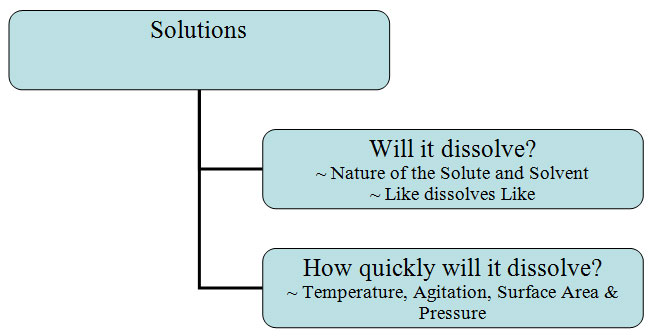The nature of the solute and solvent determines whether or not they will be able to dissolve. Nature refers to the polarity or type of bond in the substance.
Look at the pictures below. Click on each picture for more information about the solubility.
Oil and water will not dissolve no matter how much it is stirred and heated. The polar nature of water prevents it from being attracted to the non-polar oil.
![]() If oil does not dissolve in water, the universal solvent, can anything dissolve oil? Copy the table below into your notes. Make your prediction in the first column and watch the video to find out the answer. Then, complete the last two columns of the table.
If oil does not dissolve in water, the universal solvent, can anything dissolve oil? Copy the table below into your notes. Make your prediction in the first column and watch the video to find out the answer. Then, complete the last two columns of the table.
Source: How to Get Oil-Based Paint off Skin, Howcast, YouTube
| PREDICTION Can any solvent dissolve oil? |
OBSERVATIONS Record evidence from the video. |
CONCLUSIONS Does the evidence support your prediction? Explain your answer. |
Interactive popup. Assistance may be required.
| PREDICTION Can any solvent dissolve oil? |
OBSERVATIONS Record evidence from the video. |
CONCLUSIONS Does the evidence support your prediction? Explain your answer. |
Reasonable predictions can be made such as the following:
|
|
It is shown in the video that oil will not dissolve in water because it is non-polar and water is polar. However, oil does dissolve in other oils because they are non-polar. |

For the rest of this lesson, let’s think about the factors that affect how quickly solutes dissolve. Four factors determine how quickly solutes dissolve: temperature, agitation, surface area, and pressure. Not all factors impact all types of solutions. Remember, this will not cause a solute to dissolve in a solvent; it will just change the rate at which the dissolving happens.

Sources for images used in this section, as they appear, from top to bottom: